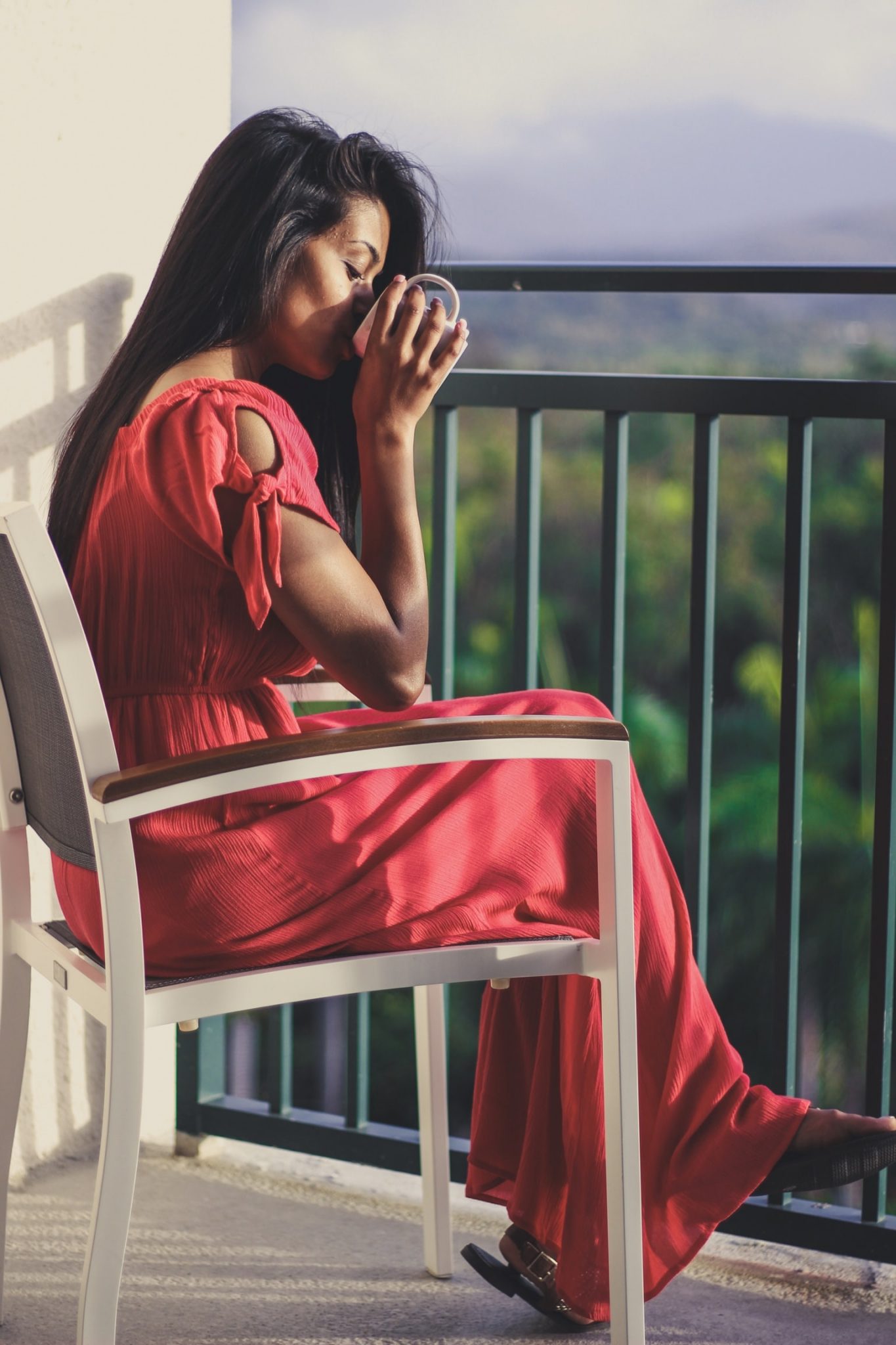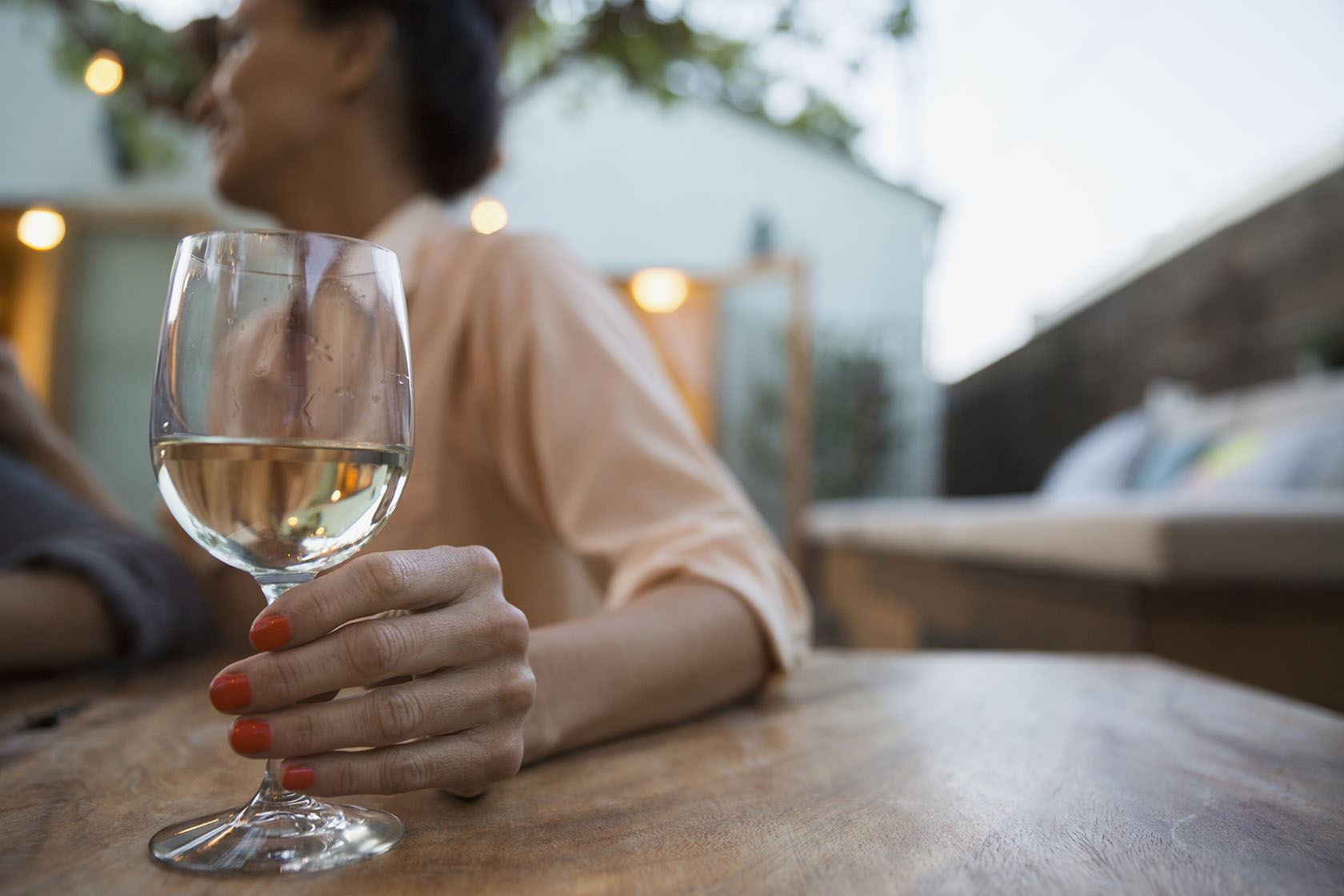Written by Kayleigh Dray
Kayleigh Dray is Stylist’s digital editor-at-large. Her specialist topics include comic books, films, TV and feminism. On a weekend, you can usually find her drinking copious amounts of tea and playing boardgames with her friends.
Holly Willoughby has nailed it: hangovers feel 100% worse in lockdown. Here, medical experts explain why.
Holly Willoughby, after reuniting with her Celebrity Juice co-star Keith Lemon on his new YouTube show, has opened up about suffering her “worst hangover” during the coronavirus lockdown.
When asked if she’s been drinking more alcohol during the UK quarantine, the This Morning presenter replied: “I haven’t stopped, I literally clock watch like is it time for an Aperol Spritz yet?”
She continued: “The trouble is you’ve got your own bottle of wine and you’re sitting there doing this [mimes pouring wine] it’s not like you’ve got to go to the bar.”
Check it out:
All it takes is one quick scour of social media to recognise that Willoughby is not alone: countless others are nursing hangovers during lockdown.
“I can safely say, I will no longer be drinking on lockdown. Heads like a burst couch and I can’t even get a milkshake to settle this hangover,” tweeted one.
“Nursing my first hangover of lockdown and I am so grateful for having to stay at home,” said another.
Still one more revealed: “I didn’t think hangovers from drinking in the house were to be taken seriously until lockdown. How am I waking up this early on a Monday to [be sick]?”
And one more added: “During UK lockdown I’ve had catastrophic hangovers that mimic symptoms but my temperature is always spot on.”
With so many claiming that these lockdown hangovers are their worst ever, we have to ask: what gives?
Well, in a bid to crack this Covid-19 mystery, Stylist’s Kayleigh Dray reached out to a handful of medical experts and asked them to take a break from (ahem) more important matters and help us understand why alcohol affects us so much more when we’re in quarantine.
Here’s what they had to say:
1) Why do hangovers seem worse in lockdown?
There could be several reasons, according to experts – the primary reason of which being that… well, that it’s just easier to get drunk.
Dr Daniel Atkinson, Clinical Director at Treated.com, says: “When you drink at home you’re essentially serving yourself. When you drink in a pub or a bar, you’re being given a measured unit each time, and you’re paying for it. So really, you’re more likely to keep track of how much you’ve had if you’re out drinking because each drink you buy costs you money.
“If you’re drinking at home, everything is ‘free’, or at least already paid for, so you might top up your glass of wine before it’s finished, or add an extra splash of gin to your glass. This makes it harder to know how much alcohol you’ve already drunk. So it’s much easier to get drunk at home, not only because alcohol is much more readily available – we just go to the kitchen for it, we don’t need to queue up in a busy bar – but also because we don’t have as tight a handle on the measures as a bartender would. And the more we drink, the worse our hangover is.
Andy King, a physician associate working in general practice, agrees.
“You’re probably drinking a bit more than you normally would as you’re in the comfort of your own home, and having less ‘rescue tap waters’ during the binge.”
And one NHS healthcare assistant, who asked to remain anonymous, adds: “You know you can drink more, because you don’t have to worry about getting home that same night, and you know that no one will see you the next day. Plus, a lay-in is guaranteed.”
Then, there’s the fact that we are all staying indoors.
King says: “Being confined to one place can have a detrimental affect on your mental health which can make you feel more tired, despondent and sluggish during the day. Plus, at home you’re probably watching a screen a lot more than you usually would. This can cause tension headaches which sometimes last for hours, adding to the torment of the hangover!”
Atkinson adds: “Normally, leaving the house to get some fresh air can help to clear our heads the morning after having a few drinks. Obviously to help prevent the spread of coronavirus, we’re rightly being urged not to go outside unless it’s essential. So restricting how often we go outside is another reason why a hangover might seem to linger a little longer.”
2) Why do we seem to get drunker quicker in lockdown?
King explains: “As mentioned already, you’re probably drinking more alcohol during lockdown as you’re in a comfortable environment, and drinking less water, replacing H2O with tea and coffee which are diuretics. You’re probably less active too which doesn’t help either!”
Our anonymous HCA agrees, pointing out: “If you’re thirsty and break-starved, like most NHS medics at the moment, you drink faster and the dehydrated body can’t flush it out.”
And Atkinson adds: “We perhaps aren’t keeping track of how much alcohol we’re drinking as tightly as we normally do when we’re out. Plus, if you usually go out in a group, you might spend more time talking in your circle of friends, which helps you to drink at a slower rate. If your household is just you and one other person, or even just you, then there might be less conversation simply because there are fewer people to carry it; so the result is you drink slightly faster.
“Also, if you’re at home, you might be drinking while watching television. This is a passive activity, and you aren’t talking to someone else while you’re doing this, so you might end up drinking faster.”
3) Should we be drinking less – if not at all – in lockdown?
While our anonymous HCA jokes that we may as well have a drink (“Who’s counting and who cares?” she says), the majority of experts say that, while it’s fine in moderation, we should all be cutting down on how much wine we’re pouring.
“Because of what’s going on, we might be tempted to drink more alcohol to help us de-stress,” says King. “But ultimately, drinking more alcohol is going to cause more problems than it solves, so you should stick to the lower risk guidelines.”
King agrees, saying: “Let’s face it, alcohol increases your risk of numerous illnesses, but, in moderation, can be part of a healthy lifestyle. However, we should all be drinking less alcohol in general and not just during lockdown.”
As a rule of thumb, Atkinson says: “Really, the same guidelines apply whether you’re drinking at home or drinking out. There is no ‘healthy’ limit for alcohol consumption. The lower risk guidelines are to drink no more than 14 units per week, and have several drink free days. If you do drink 14 units a week, you should space these out so you don’t drink them all in one sitting.
“If you are drinking at home during lockdown, it’s probably a good idea to physically set aside at the beginning of the night a sensible amount to drink; so, for example, if you only intend to drink half a bottle of wine, put it in a specific section of your kitchen or on a specific shelf in the fridge, on its own, away from your other alcohol. Then you know that once you’ve had what’s there on that shelf, that’s your sensible limit, and it’s time to move onto water or soft drinks.”
4) How do we know if our drinking habits are unhealthy?
“We might not always know, particularly at the moment, because many of us are experiencing disruption to regular life,” says Atkinson. “So what seemed excessive before might not seem so now, because we’re in isolation and don’t have those normal social touchpoints to perhaps remind us that we’ve drunk too much.
“Again, it just helps to try and keep track of what you’re drinking, and to stick to the lower risk guidelines if you do drink alcohol.”
King adds: “While drinking alcohol in moderation can be part of a healthy lifestyle, it becomes unhealthy when you exceed the recommended amount of weekly units due to health implications . If you find yourself ‘living for the next drink’ and having that thought at the forefront of your day that can be a sign that it has gone too far.
“If you find yourself self-medicating with alcohol, that can be a sign that your habit has become unhealthy. Remember: while alcohol disinhibits and relaxes you, it actually can heighten feelings of anxiety and depression the next day.”
As a rule of thumb, Atkinson suggests that you “measure how many units of alcohol you’re buying a week”.
“We might be used to using cost as a measure of how much we’re drinking. For example, if we spend X amount of pounds on a night out, that might be our limit for the week. Things are a bit different now, because people are buying alcohol to drink at home which tends to be cheaper.”
Essentially, don’t think about how much you’ve spent on alcohol: instead think about how many units you’re buying a week, that’ll give you a more realistic grasp of how much alcohol you’re consuming. That should help you to think about cutting down.
5) What, in your opinion, is the best ‘cure’ for a hangover?
Atkinson says: “This is probably not going to be a popular answer, but I would say the only proven way to beat a hangover is to not drink as much the night before! So again, think about how much you’re drinking in the moment, and when to call it a night if you want to reduce the chances of a hangover the next day.
“Not drinking on an empty stomach is important too. And because alcohol acts as a diuretic, remember to stay hydrated and make sure you drink water between drinks, and before you go to bed.”
King adds: “There are lots of old wives tales,tips and ideas on ‘what is the best hangover cure’ but really, with a hangover being the result of ‘dehydration’, I feel the best cure is to drink plenty of water and stay hydrated . A paracetamol or two can help you feel more human in the short term.
“And, while I should really be saying that ‘not getting drunk in the first place’ is the best prevention, where is the fun in that?”
Images: Vladislav Muslakov/Chris Knight/Unsplash/Getty
Source: Read Full Article



